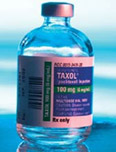Get a Mesothelioma Treatment Guide

Find a Top Mesothelioma Doctor

Access Help Paying for Treatment

Paclitaxel is a drug used experimentally in mesothelioma treatment. It may be an effective substitute for pemetrexed (Alimta) in pleural mesothelioma chemotherapy. Some peritoneal mesothelioma patients have benefited from follow-up paclitaxel treatments after surgery.

Paclitaxel is used in the treatment of all four types of asbestos-related cancer, including mesothelioma, lung, ovarian and laryngeal cancer. The U.S. Food and Drug Administration has approved it as a treatment for several cancers, including breast, ovarian, pancreatic, non-small cell lung cancer and AIDS-related Kaposi’s sarcoma.
Doctors also use it as an experimental or off-label treatment for mesothelioma, laryngeal, bladder, melanoma, esophageal and prostate cancer. Paclitaxel is commonly given in combination with cisplatin or carboplatin.
As of 2024, clinical trials are investigating paclitaxel as a treatment for pleural and peritoneal mesothelioma. These trials combine paclitaxel with immunotherapy drugs for pleural patients or apply it directly to the lining of peritoneal patients.
In general, chemotherapy drugs disrupt the division of cells that divide quickly. This prevents cancer cells from replicating and growing.
Paclitaxel is an antimicrotubule agent. Microtubules are essential to cell division. Paclitaxel binds to proteins in cell microtubules to prevent cell division and growth. This action causes cancer cells to die because they can’t divide.
Paclitaxel’s primary benefits include improved survival and reduced cancer symptoms. It improves survival by killing cancer cells and limiting their growth, potentially reducing the size of tumors. Shrinking tumors also improves the symptoms they cause.
The development of this drug dates back to the late 1960s when it was discovered in the bark of the Pacific yew tree. Researchers recognized its potential as an anti-cancer agent, but its natural scarcity made it challenging to market.
More than 20 years later, researchers found a way to produce paclitaxel synthetically in a lab. Bristol-Myers Squibb began marketing it as Taxol in the early 1990s, and generic versions of the drug are now available.
| Name | Taxol, Abraxane |
| Manufacturer | Bristol-Myers Squibb, Celgene |
| Medical Code | J9267 |
| Dosage | 135 mg/m² |
| Administration Route | Intravenous or intraperitoneal |
| Active Ingredient | Paclitaxel |
| Drug Class | Antineoplastic agent, antimicrotubule agent |
| Related Drug | Docetaxel |
| Alternate Names | Anzatax, Asotax, Bristaxol, Onxol, Praxel |
| Interacting Drug | Adenovirus types 4 and 7 live, antihistamines, apalutamide, eluxadoline, idarubicin, idelalisib, influenza virus vaccine trivalent, ivacaftor, nefazodone, opiates, palifermin, quinidine |
| Medical Studies | Intraperitoneal Paclitaxel for Patients With Primary Malignant Peritoneal Mesothelioma (INTERACT MESO) |
| FDA Warning | Skin problems, hives, acute allergic reaction characterized by breathing difficulty and low blood pressure |
In 2005, the FDA approved a new type of drug called nanoparticle albumin-bound paclitaxel, or nab-paclitaxel. In this formulation, the drug is contained in tiny particles of protein. This improves drug delivery and reduces side effects. Celgene Corporation markets nab-paclitaxel as Abraxane.
Get a Mesothelioma Treatment Guide

Find a Top Mesothelioma Doctor

Access Help Paying for Treatment

Clinical trials are recruiting pleural mesothelioma patients to test paclitaxel with two new immunotherapy drugs called NX-1607 and LMB-100. Researchers are testing the original formula of paclitaxel and the newer formula Abraxane in combination with other drugs. Additionally, a 2023 Italian test-tube study showed that stem cells loaded with paclitaxel are more effective against mesothelioma cells than the original formula of paclitaxel.
In 2021, the FDA granted orphan drug designation to ONCOFID-P, a combination of paclitaxel and hyaluronic acid. Preclinical data shows ONCOFID-P is more effective in reducing mesothelioma tumor mass than paclitaxel alone.
Past studies have reported benefits including improved pleural mesothelioma survival and symptoms. Research has found paclitaxel combined with other drugs is more effective for pleural mesothelioma than paclitaxel alone. Standard chemotherapy for mesothelioma combines pemetrexed with cisplatin or carboplatin, but pemetrexed is too toxic for some patients. Some pleural patients respond well to Abraxane with carboplatin as a second-line therapy.
Researchers have studied paclitaxel for peritoneal mesothelioma as well. Peritoneal patients may join trials testing paclitaxel as a single intraperitoneal chemotherapy drug or in combination with cisplatin applied as pressurized intraperitoneal aerosol chemotherapy.
A 2021 clinical research study concluded that large doses of intraperitoneal paclitaxel, up to 120 mg every month or 60 mg weekly, can be combined with cisplatin and other systemic agents with minimal or no additional hematologic toxicity.
A 2020 report co-authored by peritoneal mesothelioma expert Dr. Paul Sugarbaker described the long-term survival of six patients who received normothermic intraperitoneal chemotherapy (NIPEC) with paclitaxel for 6 months following surgery with hyperthermic intraperitoneal chemotherapy (HIPEC). Four patients showed no signs of cancer at 8, 13, 18 and 19 years after treatment, and two patients died 15 years after treatment.
Sugarbaker’s past research on paclitaxel also shows better outcomes for patients who receive long-term paclitaxel. In these follow-up treatments, the drug is delivered to the abdomen to prevent cancer reoccurrence.
Peritoneal specific questions I encounter commonly are what is the NIPEC procedure and how does a doctor determine whether that is done or not? Do they need further chemo after NIPEC?

Paclitaxel is commonly used to treat the other three types of asbestos-related cancer, including lung, ovarian and laryngeal cancer. The FDA has approved paclitaxel for several different types of asbestos-related lung cancer including small cell, non-small cell and non-squamous lung cancer. It is often combined with immunotherapy or other chemotherapy drugs to increase its effectiveness.
The agency approved paclitaxel for advanced cases of ovarian cancer in the 1990s. It is combined with cisplatin as a first-line therapy or as a standalone treatment for patients who have previously undergone other treatments.
Oncologists use paclitaxel with cisplatin and radiation therapy to improve survival outcomes for people with laryngeal cancer. This treatment combination improves overall survival and symptoms like jaw-related problems, eating limitations and facial pain.
Like most chemotherapy drugs, paclitaxel damages healthy and cancerous cells. Side effects are usually worse about 15 to 21 days after treatment.
Reporting side effects to your oncologist as soon as they develop helps prevent them from worsening. Even if you believe the effect is tolerable or expected, report it anyway. Your medical team can assess the severity of side effects and offer advice or treatment to control them.
While uncommon, report and monitor rare side effects of paclitaxel if any develop. Your medical team can advise whether certain side effects warrant medical attention.
In rare cases of partial tumor response to paclitaxel as a single agent for pleural mesothelioma, there have been reports of cardiac arrhythmias and peripheral neuropathy. These patients’ tumors may have responded better to paclitaxel, but the side effects were significant. Contact your doctor as soon as possible if you experience any serious side effects while taking paclitaxel.
This Page Contains 12 Cited Articles
The sources on all content featured in The Mesothelioma Center at Asbestos.com include medical and scientific studies, peer-reviewed studies and other research documents from reputable organizations.
Your web browser is no longer supported by Microsoft. Update your browser for more security, speed and compatibility.
If you are looking for mesothelioma support, please contact our Patient Advocates at (855) 404-4592
The Mesothelioma Center at Asbestos.com has provided patients and their loved ones the most updated and reliable information on mesothelioma and asbestos exposure since 2006.
Our team of Patient Advocates includes a medical doctor, a registered nurse, health services administrators, veterans, VA-accredited Claims Agents, an oncology patient navigator and hospice care expert. Their combined expertise means we help any mesothelioma patient or loved one through every step of their cancer journey.
More than 30 contributors, including mesothelioma doctors, survivors, health care professionals and other experts, have peer-reviewed our website and written unique research-driven articles to ensure you get the highest-quality medical and health information.
My family has only the highest compliment for the assistance and support that we received from The Mesothelioma Center. This is a staff of compassionate and knowledgeable individuals who respect what your family is experiencing and who go the extra mile to make an unfortunate diagnosis less stressful. Information and assistance were provided by The Mesothelioma Center at no cost to our family.LashawnMesothelioma patient’s daughter


Selby, K. (2024, September 10). Paclitaxel (Taxol). Asbestos.com. Retrieved January 10, 2025, from https://www.asbestos.com/treatment/drugs/paclitaxel/
Selby, Karen. "Paclitaxel (Taxol)." Asbestos.com, 10 Sep 2024, https://www.asbestos.com/treatment/drugs/paclitaxel/.
Selby, Karen. "Paclitaxel (Taxol)." Asbestos.com. Last modified September 10, 2024. https://www.asbestos.com/treatment/drugs/paclitaxel/.
Dr. Rupesh Kotecha is a renowned radiation oncologist in leadership roles at Miami Cancer Institute. He is an associate professor at Florida International University's college of medicine and an adjunct faculty member at Memorial Sloan Kettering.
Our fact-checking process begins with a thorough review of all sources to ensure they are high quality. Then we cross-check the facts with original medical or scientific reports published by those sources, or we validate the facts with reputable news organizations, medical and scientific experts and other health experts. Each page includes all sources for full transparency.
Please read our editorial guidelines to learn more about our content creation and review process.
Mesothelioma Center - Vital Services for Cancer Patients & Families doesn’t believe in selling customer information. However, as required by the new California Consumer Privacy Act (CCPA), you may record your preference to view or remove your personal information by completing the form below.
